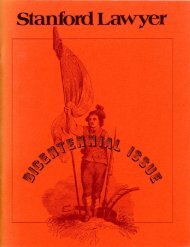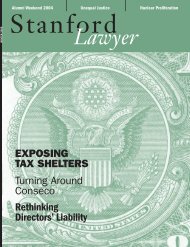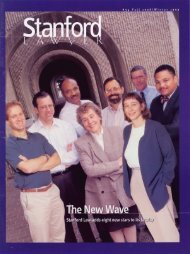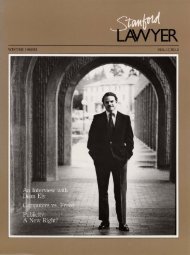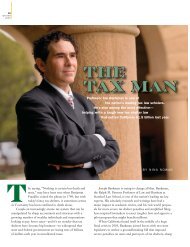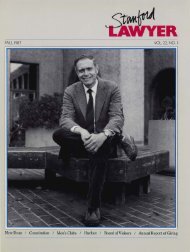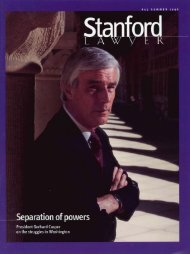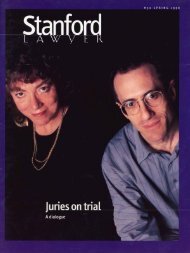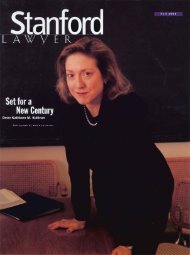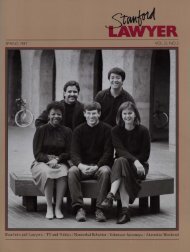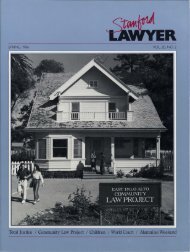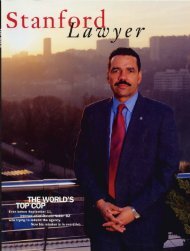Summer 1999 – Issue 55 - Stanford Lawyer - Stanford University
Summer 1999 – Issue 55 - Stanford Lawyer - Stanford University
Summer 1999 – Issue 55 - Stanford Lawyer - Stanford University
- No tags were found...
Create successful ePaper yourself
Turn your PDF publications into a flip-book with our unique Google optimized e-Paper software.
with the faculty-"herding cats" is acommon metaphor. If so, that explainsmy relatively long tenure. Of course, Ihave a little black book ofsecrets aboutcolleagues that could nicely supplementmy future income. But the <strong>Stanford</strong> lawfaculty's spirit, commitment, and forgivenesshave made this dean's life a joy.With respect to forgiveness, I think particularlyofa day-long retreat that I unintentionallyscheduled on Big Gameday. (See spectator sports, supra.) It willbe another half-century before the Deanof <strong>Stanford</strong> Law School can mentionthe word "retreat" or "facilitator." Ifthere's one take-home point from myyears as an administrator, it's how muchone can accomplish when the faculty areinformed and consulted, and how badlythings go if they are blindsided.The students also have been a joy.The practice of leaving my office dooropen has led to conversations on everyministrative staff working behind thescenes. My first instinct as Dean was tomicromanage everything. It took a whileto learn that micromanaging a well-functioningadministrative unit was counterproductive,and that micromanaginga poorly functioning unit just postponedaddressing its problems. Perhaps themost important thing I've learned aboutorganizations is how much they dependon people regularly going beyond theirformal job descriptions, how much theirwillingness to do this depends on thespirit of the place-and the importanceof the CEO in maintaining that spirit.Like most law professors, I had littlecurrent knowledge ofthe careers intowhich we send our students. Twelve yearslater, I have a pretty good sense of theprofession. I could also write the definitivecoffee-table book on comparativelaw firm decor.A few years ago, <strong>Stanford</strong> took theour graduates are finding rewarding careers(in all senses) in business. The twinchallenges for the School and the professionare how to increase the professionaland personal satisfactions of privatepractice, and how to expand theLoan Repayment Assistance Programand find other means to enable <strong>Stanford</strong>graduates to pursue careers in public servicedespite the mounting costs of privateeducation.Turning to the School's core educationalmission, the past 12 years havebeen a period of considerable experimentationand innovation. We have developedleading programs in business,technology, environmental law, and conflictresolution. My greatest disappointmentinvolves public interest. Despitestrong course offerings, we lack a coregroup offaculty whom the students canlook to as mentors and, at least until recently,we have not had strong clinicalONE OF THE GREATEST JOYS OF THE DEANSHIP HAS BEEN GETTING TO KNOW ALUMNI, LEARNING FROMTHEM, AND BRINGING WHAT I LEARNED BACK TO THE LAW SCHOOL. IN THE PROCESS,I'VE MADE SOMELIFELONG FRIENDS-AND I ALSO HAVE A FEW REALLY GOOD STORIES THAT I'LL TELL OVER A BEER.conceivable topic-and some inconceivableones-and to an appreciationof students' varied backgrounds, interests,and concerns. Sure, there have beenmoments of tension as well. In contrastto most other graduate students, oursare a pretty political bunch, with themost "progressive" voices usually beingthe loudest. All things being equal, I prefernot to be depicted as Genghis Khan.But a law school would be an impoverishedplace if students were indifferentto the pressing social issues ofour times.As a faculty member, I did not appreciatejust how much the School's functioningdepended on an excellent adleadin establishing an annual "conversation"among a dozen law school deansand partners from the nation's majorfirms. We discuss an array of commonissues, including the academy's role inpreparing students for practice, the ethosand diversity of the profession, and itsglobalization. The problem that mostconcerns me-and many managing partners-isthe reported decline of satisfactionwith large law firm practice. Incontrast, many alumni working in governmentand the not-for-profit sectorfind their work fulfilling even while earningfar less than they could in privatepractice. And an increasing number ofplacements. On the bright side, the numberand quality ofclinical placements atthe East Palo Alto Law Project were atan all-time high this year. The challengenow is to create a vibrant public interestcommunity within the School.At the same time as the faculty hasbuilt pillars ofsubstantive excellence, wehave been rethinking trans-substantiveaspects ofthe curriculum. These includeskills useful across a wide range ofcareers(e.g., communication, quantitative methods,policy analysis, problem solving,and negotiation), ethics and professionalresponsibility, and new approaches toContinued 011 page 68~TANF()RD LAWVlR ED




